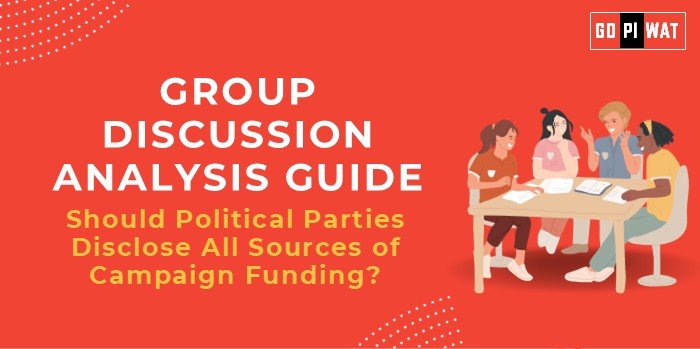📋 Group Discussion (GD) Analysis Guide: Should Political Parties Disclose All Sources of Campaign Funding?
🌐 Introduction to the Topic
- 📖 Context: Transparency in political funding is a cornerstone of democratic accountability. The debate on whether political parties should fully disclose their funding sources highlights tensions between transparency and donor privacy.
- 💡 Background: Political funding has often been criticized for fostering corruption, undue influence, and lack of accountability. Globally, countries like the US and UK have stringent disclosure norms, while many others struggle with opacity.
📊 Quick Facts and Key Statistics
- 🌍 Global Transparency Ranking: Transparency International ranks 26% of countries as “opaque” in political financing.
- 💰 India’s Electoral Bonds: Over ₹12,000 crore raised through electoral bonds since 2018, with donor anonymity criticized.
- 📈 Campaign Costs: The 2020 US Presidential Election cost $14 billion, showcasing the financial scale of modern campaigns.
- ⚠️ Corruption Impact: Countries with high opacity in funding score lower on democratic indices (Freedom House, 2023).
👥 Stakeholders and Their Roles
- 🏛️ Political Parties: Main recipients of funding, responsible for transparency.
- 💼 Donors: Corporates, individuals, and organizations who influence policies through donations.
- 🗳️ Electoral Commissions: Ensure compliance with disclosure norms and penalize violations.
- 🙋 Citizens: Assess political parties’ integrity based on funding transparency.
- 📡 Media and Civil Society: Act as watchdogs to expose irregularities.
🏆 Achievements and Challenges
✨ Achievements:
- 🔍 Increased Scrutiny: Many countries mandate partial disclosure of large donations.
- 📜 Regulatory Success: Limits on corporate funding in countries like Canada and the UK.
- 🌟 Global Awareness: Campaigns by organizations like Transparency International have pushed for reform.
- 💻 Digital Innovations: Platforms in the EU provide real-time funding disclosures.
⚠️ Challenges:
- 🕵️ Donor Anonymity vs. Transparency: Electoral bonds and similar mechanisms shield donor identities.
- 💸 Black Money Influx: Unaccounted cash flows into campaign funds.
- 🔍 Selective Enforcement: Political bias in investigating funding violations.
- 🌐 Global Comparisons:
- ✅ Success: Canada’s robust disclosure norms requiring all contributions above CAD 200 to be reported.
- ⚠️ Challenges: Limited enforcement in developing democracies.
📄 Structured Arguments for Discussion
- 👍 Supporting Stance: “Full disclosure of funding sources will enhance accountability, deter corruption, and strengthen democracy.”
- 👎 Opposing Stance: “Mandatory disclosure may discourage donations, especially from those fearing retribution for political affiliations.”
- ⚖️ Balanced Perspective: “While transparency is vital, safeguards must ensure donors’ legitimate privacy rights are protected.”
💬 Effective Discussion Approaches
- 🎯 Opening Approaches:
- 📊 Begin with impactful data: “Over ₹12,000 crore raised anonymously via electoral bonds in India raises critical questions about accountability.”
- 🌍 Reference global benchmarks: “Canada and the US have demonstrated that transparency can coexist with robust political fundraising.”
- 🤝 Counter-Argument Handling:
- ✅ Highlight the importance of trust and democratic accountability over donor fears.
- 💡 Propose technological solutions to anonymize donor identities while ensuring traceability for regulators.
🔎 Strategic Analysis of Strengths and Weaknesses
- 💪 Strengths: Promotes accountability, reduces corruption, builds public trust.
- ❌ Weaknesses: Privacy concerns, risk of reduced funding.
- 🌟 Opportunities: Leverage technology for secure, transparent reporting.
- ⚠️ Threats: Resistance from entrenched political interests, donor retaliation fears.
🎓 Connecting with B-School Applications
- 🌍 Real-World Applications: Topics like ethical leadership, corporate governance, and public accountability.
- 📝 Sample Interview Questions:
- 💡 “How can technology help achieve transparency in political funding?”
- 🔍 “Evaluate the impact of donor anonymity on democratic integrity.”
- ✨ Insights for Students: Explore how financial accountability models can be adapted for corporate governance or public administration.


